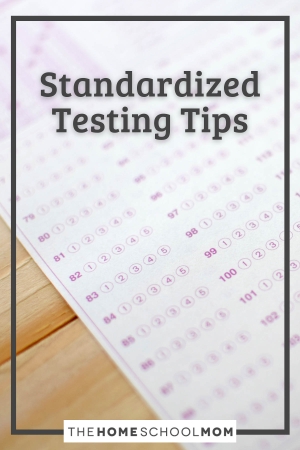About this time of year, those of us who are required by law to test our children are starting to re-focus our energies on "just the facts".
Not every state requires testing, but many of us test our students anyway to get a sense of satisfaction about what they have learned for this year. Sometimes we do it just to confirm what we already know (both positive and negative).

Anyway, I could give you long lectures on the differences between the different kinds of tests or tell you where you can get materials to prep your students, but I don't want to spend a lot of time telling you all that.
I will tell you that if you are using prep for the purpose of making sure your student knows *everything* before the test, you are probably already too late.
I remember the first time I was "prepping" my son for testing. We got to the dictionary usage part of the practice quiz. It asked him how many syllables were in the word "unique". He pronounced it U- nick-er (go figure) and so he said 3. BUT on the very same area of the question page was a copy of a section of the dictionary page with that word on it.
I asked him why he just didn't look up there and his response was "I thought that would be cheating". Was I glad I took the time and expense to get some "prep" materials? You betcha! But, I only did it that one year to make sure he knew that using the tools given him was not cheating!
If you have not been "teaching to the test" then you deserve to be commended and you probably do NOT need to be panicking right now. I realize that most of us feel like the testing is evaluating our performance as teachers, but it really can be a perfectly helpful tool.
Even if you teach with a less traditional method, I think you will be pleasantly surprised at the results you will be seeing. We spend a great deal of time researching homeschooling and putting into practice all the wonderful things we are learning. So, if you are taking the time to help your child think, you will find that he will probably test very well.
I used to administrate the IOWA Basic Skills testing for my local support group. Here are just a few things that I suggested to my testers on the day of testing.
You as a parent may want to do some of those things at home as well. Some are things you can do whether or not you are testing in your house. Others are things that you as a parent can do to prepare your student and yourself for testing away from your home.
- Plan on having fun. Make "test day/s" a fun event.
My children look forward to testing each year because the often get to see children that they might not see any other time during the school year. If you are testing with a group, chances are your testers will be working their hardest to make the experience a pleasant one for your student. I never try and do any other school on the testing day. I figure with the stress and excitement, the 3 hours a day of testing is plenty on those days.
- Take frequent breaks.
Watch for signs of fatigue. Have at least one snack break every hour to hour and a half.
- Don't put your stress on your student.
I always tell mine "Do your best and have fun!". If you spend the entire time prior to testing saying: "you're going to fail and I'm going to look bad", OR "if you do badly on the test I'm putting you back in school", etc., you are probably not preparing your student to have the best frame of mind by the time he is due to test and he may have trouble doing his best.
- Make sure your student is well-rested on the testing dates.
Feed him a good breakfast and make sure he comes prepared to test (usually testers want 2 number 2 pencils - preferably sharpened, etc.) Even at home, that puts your student in a "testing" frame of mind.
- If you are testing your own student, please try NOT to look at his answers while he is testing or immediately afterwards.
These tests are "norm" scored (that means they are in comparison to national norms). By watching your student write down possibly wrong answers and reacting (yeah, I know we know how to hide our feelings - but testing can be different), your student can be tempted to change his answers and then we are throwing the norms. I do feel that everything we do needs to be done with integrity, and this testing is no exception.
- Plan to go out and celebrate after the last day of testing.
Wrap up the event with an ice cream at McDonald's or anything else you deem appropriate.
After the testing is finished, enjoy the time while you wait for the results (usually 5-8 weeks). When the results come in, look for the positives FIRST, then look at what items you may need to add to your goals for next year.
There will probably be little or no surprises in the testing results. If there is, then you can be even more pleased that your student took the test so that you might catch this "gap" before it became a problem.
Testing is just one more tool in our arsenal. Use it for how it is designed and you can actually be grateful for the opportunity! Some of us do not want to and are not required to test. That's fine! This is just a few helpful hints for those of us who will be testing this year.
This article was originally published in The Homeschooler's Notebook, a free newsletter created by veteran homeschooler Lynn Hogan. Shared with permission.





Leave a Reply